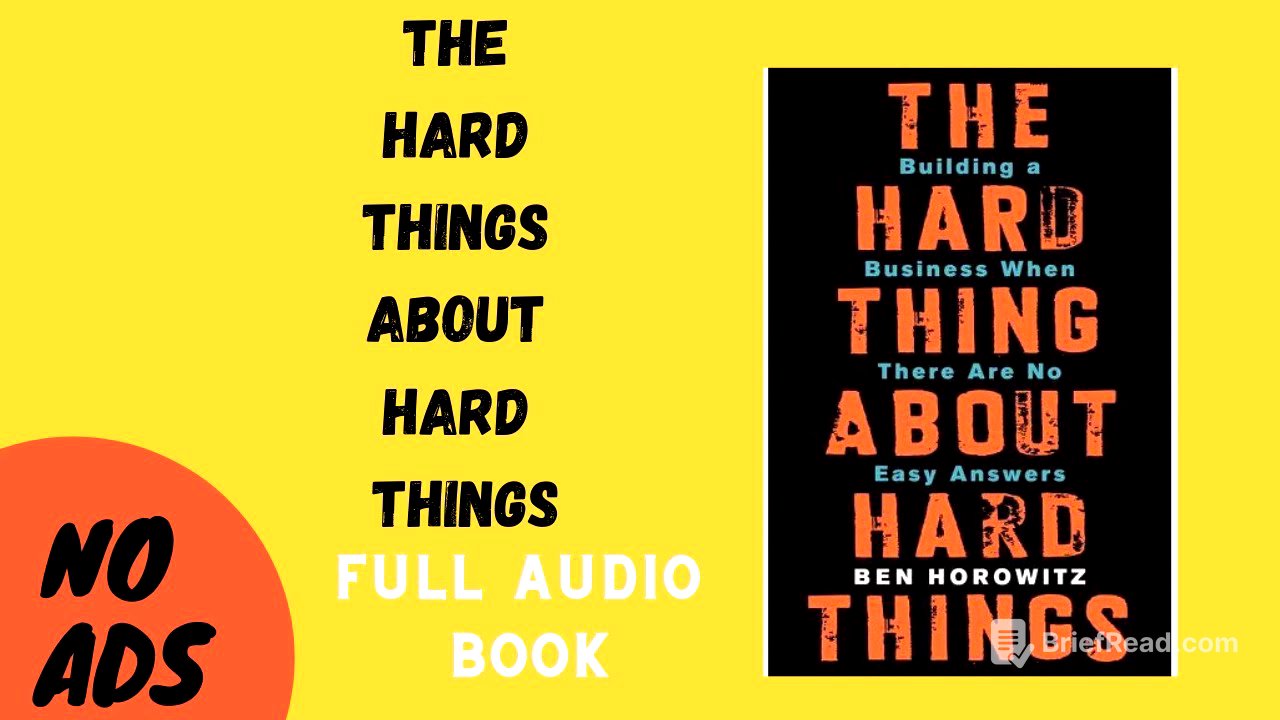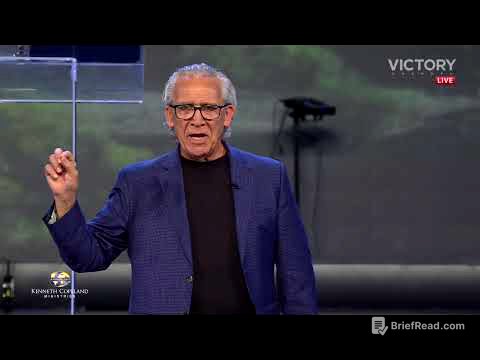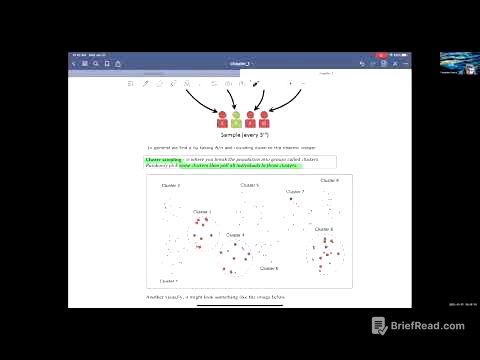TLDR;
This text is an autobiography of Ben Horowitz, detailing his journey from a communist upbringing to becoming a successful venture capitalist. He shares key lessons learned as an entrepreneur, CEO, and investor, emphasizing the importance of facing hard things head-on, building strong company cultures, and making difficult decisions with courage and integrity.
- Overcoming fear and adversity are crucial for success.
- Strong company cultures are built on trust, transparency, and valuing people.
- Effective leadership requires both vision and the ability to execute.
Introduction [0:26]
The author introduces the core theme of the book: the hard things about hard things. He argues that most management and self-help books fail to address the real challenges of running a company, such as laying off employees or dealing with entitlement. The book aims to share his personal story and lessons learned as an entrepreneur, CEO, and venture capitalist, offering insights and inspiration for others facing similar struggles.
On From Communist to Venture Capitalist [3:28]
The author recounts his unconventional upbringing in Berkeley, California, with communist grandparents and a father who edited a radical left magazine. He shares a childhood experience of being dared to confront an African-American kid, which taught him not to judge things by their surfaces and the importance of personal experience. He also discusses his time on the Berkeley High School football team, where he learned about leadership and the value of diverse perspectives.
Turn Your Shit In [9:37]
The author shares a story from his high school football experience, highlighting the intense and hilarious leadership style of Coach Mendoza. He emphasizes the importance of curiosity and diverse perspectives, recounting how his involvement in both the football team and the academic track broadened his understanding of the world. This ability to separate facts from perception would later serve him well as an entrepreneur and CEO.
Blind Date [12:51]
The author recounts a story about his blind date with his future wife, Felicia, and a basketball fight he had the day before. He emphasizes the importance of not relying on first impressions and taking the time to understand people and situations. Despite initial misgivings, their relationship blossomed into a happy marriage of nearly 25 years.
Silicon Valley [16:16]
The author describes his early experiences in Silicon Valley, working at Silicon Graphics (SGI) and later at a startup called Netlabs. He learned the importance of founders running their companies and the challenges of working in a company with misguided leadership. He also shares a personal story about his daughter's autism diagnosis and the financial struggles his family faced, leading him to prioritize his family over his career.
Netscape [20:11]
The author recounts his time at Netscape, joining the company after being inspired by the Mosaic browser. He describes the company's mission to make the internet the network of the future and the challenges they faced against proprietary technologies from industry powerhouses like Microsoft and Oracle. He shares anecdotes about co-founder Mark Andreessen and the intense competition with Microsoft, ultimately leading to Netscape's acquisition by AOL.
I Will Survive [36:11]
The author discusses the founding of Loudcloud with Mark Andreessen and others, securing significant venture capital funding. He describes the rapid growth of the company and the challenges they faced during the dot-com crash. Despite the difficult environment, they found investors for a series C round at a high valuation.
Euphoria and Terror [43:21]
The author describes the continued challenges Loudcloud faced, including the need to raise more money in a disastrous market climate. He recounts a meeting with SoftBank Capital where they were told they were "smoking crack." He discusses the option of going public and the difficult decision-making process with the board, ultimately deciding to proceed with an IPO despite the negative press and market conditions.
Blind Date [50:06]
The author describes the grueling IPO road show and the personal challenges he faced, including his wife's health scare. Despite the difficult circumstances, they successfully completed the IPO, raising $162.5 million. He recounts a conversation with his wife about Yahoo's CEO being fired, highlighting the stress and uncertainty of the time.
If You're Going to Eat, Don't Nibble [59:57]
The author discusses the challenges of being a public company, including resetting guidance and laying off employees. He describes the impact of the September 11th terrorist attacks on their business and the subsequent bankruptcy of their largest competitor, Exodus. He explores the option of acquiring Data Return but ultimately decides against it, realizing Loudcloud's future may not be bright.
What Would I Do If We Went Bankrupt [1:06:15]
The author describes his decision to shift Loudcloud from a cloud service to a software company, developing the Opsware software. He recounts the challenges of separating Opsware from Loudcloud and the resistance he faced from some employees. He emphasizes the importance of making decisions based on the complete picture and taking responsibility for the company's survival.
Atrix Is on the Phone [1:10:30]
The author describes the crisis when Loudcloud's largest customer, Atrix, went bankrupt, leaving them $25 million short of break-even. He recounts the decision to sell Loudcloud to EDS and the difficult process of laying off employees. He emphasizes the importance of treating people fairly during layoffs and ensuring they know where they stand.
This Time With Feeling [1:20:05]
The author describes the aftermath of the EDS sale, with the stock price plummeting and the need to resell the Opsware opportunity to employees. He recounts an offsite meeting where he asked employees to commit to the new vision. He discusses the challenges of shipping a product and rebuilding the executive team.
60 Days to Live [1:24:39]
The author describes a new crisis with EDS, who wanted to cancel their contract. He recounts the efforts of Jason Rosenthal and Anthony Wright to save the account, ultimately convincing EDS to give them 60 days to fix the problems. He describes the daily meetings and the search for "exciting value" to offer EDS.
Tangram [1:32:17]
The author describes the decision to acquire Tangram, a small company, to provide EDS with the software they wanted. He recounts the due diligence process and the team's initial objections to the acquisition. He emphasizes the importance of delivering on promises and saving the EDS account.
We Saved the Account [1:35:54]
The author describes the aftermath of the Tangram acquisition, including the decision to keep the North Carolina location and the tragic story of Tangram CFO John Nelly's brain cancer. He recounts his decision to pay for Nelly's health costs and the handwritten letter he received from Nelly's wife after his death. He emphasizes the importance of knowing what desperation feels like.
Survival of the Fittest [1:38:18]
The author describes new challenges, including increased competition and a dwindling stock price. He recounts his decision to level with the engineering team and ask them to commit to a new product development effort. He shares a story from one of his engineers, Ted Crossman, about the hard work and camaraderie during that time.
What Are We Not Doing [1:45:05]
The author describes the process of defining the new product and the challenges of prioritizing features. He emphasizes the importance of innovation and the need to ignore conventional wisdom. He recounts the acquisition of Rendition Networks and the subsequent deal with Cisco Systems.
The Ultimate Decision [1:48:00]
The author describes the growing momentum of Opsware and the rising stock price. He recounts the decision to sell the company, receiving multiple acquisition offers. He emphasizes the importance of making the right decision for the team and the company, ultimately selling to HP for $1.65 billion.
This Time With Feeling [1:53:25]
The author reflects on the long journey from Loudcloud to Opsware and the emotional toll of selling the company. He realizes it was the smartest thing he'd ever done. He decides to build a new kind of venture capital firm, which will be explored in chapter nine.
When Things Fall Apart [1:55:39]
The author introduces the concept of determinate versus indeterminate situations, using calculus and statistics as metaphors. He recounts a conversation with Bill Campbell, who advised him to prepare for bankruptcy despite working on a deal to save the company. He emphasizes the importance of not playing the odds and finding the answer, regardless of the challenges.
The Struggle [2:02:48]
The author defines "the struggle" as the difficult and painful reality of running a company, where dreams turn into nightmares and self-doubt becomes self-hatred. He emphasizes that the struggle is where greatness comes from and offers advice on how to make it through without quitting.
CEOs Should Tell It Like It Is [2:07:40]
The author emphasizes the importance of transparency and honesty in leadership, recounting his own experience of being too positive as a young CEO. He argues that telling things as they are builds trust, engages more brains in solving problems, and fosters a healthy company culture.
The Right Way to Lay People Off [2:14:31]
The author shares his experience with multiple layoffs at Loudcloud and Opsware, emphasizing the importance of doing it the right way to preserve the company's culture. He outlines a step-by-step process for conducting layoffs with respect and clarity, including getting your head right, not delaying, being clear about why, training managers, addressing the company, and being visible.
Preparing to Fire an Executive [2:19:48]
The author provides guidance on how to fire an executive correctly, emphasizing the importance of preparation and fairness. He outlines a four-step process: root cause analysis, informing the board, preparing for the conversation, and preparing the company communication.
Demoting a Loyal Friend [2:35:20]
The author discusses the difficult decision of demoting a loyal friend, emphasizing the importance of considering the good of the whole company. He outlines the steps to take, including deciding what you really want to do, breaking the news, and offering alternatives.
Lies That Losers Tell [2:41:33]
The author identifies common lies that companies tell themselves when they are losing, such as "she left but we were going to fire her anyway" or "we would have won but the other guys gave the deal away." He explains that these lies come from a desire to avoid dealing with the obvious facts and emphasizes the importance of honesty and self-awareness.
Lead Bullets [2:46:21]
The author emphasizes the importance of focusing on the core problem and not looking for silver bullets to avoid the battle. He recounts his experience at Netscape and Opsware, where they had to focus on building a better product to compete with Microsoft and BladeLogic.
Nobody Cares [2:50:25]
The author shares a story about a conversation with Al Davis, who told him, "Bill, nobody cares, just coach your team." He emphasizes the importance of focusing on what you can do and not worrying about what you can't control.
Take Care of the People, the Products, and the Profits in That Order [2:52:54]
The author emphasizes the importance of taking care of the people, the products, and the profits in that order. He discusses the importance of building a good company culture, training employees, and creating a good place to work.
A Good Place to Work [2:59:37]
The author emphasizes the importance of creating a good place to work, where people can focus on their work and have confidence that good things will happen. He recounts an experience where he threatened to fire a manager for not having one-on-one meetings with his employees, highlighting the importance of clear expectations and accountability.
Why Startups Should Train Their People [3:09:25]
The author emphasizes the importance of training employees, recounting his experience at Netscape and Loudcloud. He outlines the reasons why startups should train their people, including productivity, Performance Management, product quality, and employee retention.
Good Product Manager, Bad Product Manager [3:24:24]
The author shares a document he wrote called "Good Product Manager, Bad Product Manager," which he used to train his team at Netscape. He outlines the key characteristics of good and bad product managers, emphasizing the importance of knowledge, responsibility, and communication.
Is It Okay to Hire People From Your Friend's Company [3:27:24]
The author discusses the ethical considerations of hiring employees from your friend's company. He emphasizes the importance of transparency and communication, outlining a process for handling these situations with respect and fairness.
Why It's Hard to Bring Big Company Execs Into Little Companies [3:36:19]
The author discusses the challenges of hiring big company executives into small companies, highlighting the differences in rhythm and skill set. He outlines interview questions to screen for mismatches and emphasizes the importance of aggressive integration.
Hiring Executives If You've Never Done the Job [3:44:23]
The author provides guidance on how to hire executives if you've never done the job, emphasizing the importance of knowing what you want and running a process that figures out the right match. He outlines a process for defining the strengths and weaknesses, developing questions, assembling an interview team, and conducting reference checks.
What Are We Not Doing [3:53:12]
The author emphasizes the importance of asking "what are we not doing" to identify opportunities for improvement. He recounts the decision to acquire Rendition Networks and the subsequent deal with Cisco Systems.
The Ultimate Decision [3:56:09]
The author emphasizes the importance of making the right decision for the team and the company, even when it's difficult. He recounts the story of selling Opsware to HP and the emotional toll it took on him.
Concerning the Going Concern [3:59:59]
The author discusses the importance of dealing with difficult situations and making tough decisions, even when they are unpopular. He emphasizes the importance of clarity and communication in these situations.
How to Minimize Politics in Your Company [4:19:50]
The author discusses the importance of minimizing politics in your company, emphasizing that political behavior often starts with the CEO. He outlines techniques for minimizing politics, including hiring people with the right kind of ambition and building strict processes for potentially political issues.
The Right Kind of Ambition [4:32:58]
The author emphasizes the importance of hiring people with the right kind of ambition, which is ambition for the company's success with the executive's own success only coming as a byproduct. He outlines how to screen for the right kind of ambition in an interview.
Titles and Promotions [4:39:57]
The author discusses the importance of managing titles and promotions carefully, outlining the dangers of the Peter Principle and the law of crappy people. He emphasizes the importance of a properly constructed and highly disciplined promotion process.
When Smart People Are Bad Employees [4:49:57]
The author discusses the challenges of dealing with smart people who are bad employees, outlining three types: the heretic, the flake, and the jerk. He emphasizes the importance of setting clear expectations and holding people accountable.
60 Days to Live [4:53:14]
The author emphasizes the importance of knowing when to "hold the bus" for talented but difficult employees. He emphasizes the importance of having a backup plan and being prepared to make tough decisions.
Follow the Leader [4:58:19]
The author discusses the importance of leadership, outlining three key traits: the ability to articulate the vision, the right kind of ambition, and the ability to achieve the vision. He emphasizes that leadership can be developed through focus and hard work.
Peacetime CEO, Wartime CEO [5:01:58]
The author discusses the differences between peacetime and wartime CEOs, outlining the different skill sets and approaches required for each. He emphasizes the importance of understanding the context and adapting your leadership style accordingly.
Making Yourself a CEO [5:11:45]
The author emphasizes that being a CEO requires lots of unnatural motion and that it is a skill that can be learned through practice and hard work. He outlines the keys to becoming elite at giving feedback and emphasizes the importance of authenticity and directness.
How to Evaluate CEOs [5:40:39]
The author provides guidance on how to evaluate CEOs, outlining three key questions: does the CEO know what to do, can the CEO get the company to do what she knows, and did the CEO achieve the desired results against an appropriate set of objectives. He emphasizes the importance of strategy, decision-making, and building a world-class team.
First Rule of Entrepreneurship: There Are No Rules [5:40:39]
The author shares a story about a crisis during the sale of Opsware, where Ernst & Young nearly destroyed the deal. He emphasizes the importance of dealing with the unexpected and finding a way to overcome challenges.
The Sky Is Purple [7:08:33]
The author emphasizes the importance of adapting to changing circumstances and not being afraid to challenge conventional wisdom. He recounts his experience at Opsware, where they had to deal with the fact that the sky was purple and find a way to move forward.
The End of the Beginning [7:34:59]
The author reflects on his journey from Loudcloud to Opsware and the lessons he learned along the way. He recounts a conversation with David Burn, who questioned his ability to run Loudcloud, and how that experience inspired him to start Andreessen Horowitz. He emphasizes the importance of having some experience in founding and running companies to advise other entrepreneurs.









